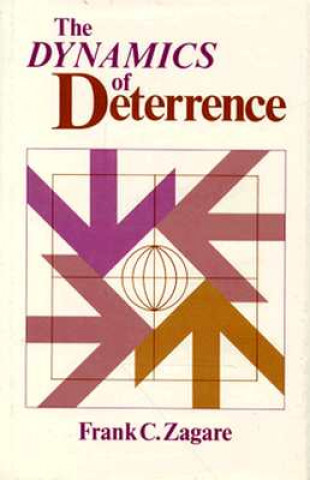
Kód: 04550788
Dynamics of Deterrence
Autor Frank C. Zagare
The value of a theory of deterrence lies in its ability to reconstruct and predict strategic behavior accurately and consistently. Contemporary scholarship on deterrence has drawn upon decision models and classical game theory, wi ... celý popis
- Jazyk:
 Angličtina
Angličtina - Vazba: Pevná
- Počet stran: 259
Nakladatelství: University of Chicago Press, 1986
- Více informací o knize

1474 Kč
Dostupnost:
50 % šance Máme informaci, že by titul mohl být dostupný. Na základě vaší objednávky se ho pokusíme do 6 týdnů zajistit.
Máme informaci, že by titul mohl být dostupný. Na základě vaší objednávky se ho pokusíme do 6 týdnů zajistit.Prohledáme celý svět
Mohlo by se vám také líbit
-

Intelligent Control
1440 Kč -

Stay off the Skyline
426 Kč
Darujte tuto knihu ještě dnes
- Objednejte knihu a zvolte Zaslat jako dárek.
- Obratem obdržíte darovací poukaz na knihu, který můžete ihned předat obdarovanému.
- Knihu zašleme na adresu obdarovaného, o nic se nestaráte.
Informovat o naskladnění knihy
Zadejte do formuláře e-mailovou adresu a jakmile knihu naskladníme, zašleme vám o tom zprávu. Pohlídáme vše za vás.
Více informací o knize Dynamics of Deterrence
Nákupem získáte 147 bodů
 Anotace knihy
Anotace knihy
The value of a theory of deterrence lies in its ability to reconstruct and predict strategic behavior accurately and consistently. Contemporary scholarship on deterrence has drawn upon decision models and classical game theory, with some success, to explain how deterrence works. But the field is marked by unconnected and sometimes contradictory hypotheses that may explain one type of situation while being inapplicable to another. "The Dynamics of Deterrence" is the first comprehensive treatment of deterrence theory since the mid-1960s. Frank C. Zagare introduces a new theoretical framework for deterrence that is rigorous, consistent, and illuminating. By placing the deterrence relationship in a "theory of moves" framework, Zagare is able to remedy the defects of other models. His approach is illustrated by and applied to a number of complex deterrence situations: the Berlin crisis of 1948, the Middle East crises of 1967 and 1973, and The Falkland/Malvinas crisis of 1980. He also examines the strategic relationship between the United States and the Soviet Union from 1945 to the present. Zagare studies the dynamics of both mutual and unilateral deterrence games in nuclear and non-nuclear situations, and the impact of credibility, capability, and power asymmetries on deterrence stability. He shows that his theory is applicable for analyzing deterrence situations between allies as well as between hostile states. One of the additional strengths of his model, however, is its general usefulness for other levels and settings, such as deterrence games played by husband and wife, parent and child, employer and employee, and the state and its citizens. With its lucid prose and illustrative examples, "The Dynamics of Deterrence" will be of interest to a wide audience in international relations, peace studies, and political science.
 Parametry knihy
Parametry knihy
Zařazení knihy Knihy v angličtině Society & social sciences Politics & government International relations
1474 Kč
- Plný název: Dynamics of Deterrence
- Autor: Frank C. Zagare
- Jazyk:
 Angličtina
Angličtina - Vazba: Pevná
- Počet stran: 259
- EAN: 9780226977638
- ID: 04550788
- Nakladatelství: University of Chicago Press
- Hmotnost: 481 g
- Rozměry: 278 × 154 × 18 mm
- Datum vydání: September 1986
Oblíbené z jiného soudku
-

Diplomacy
445 Kč -

Oxford Handbook of the Use of Force in International Law
1719 Kč -

Gideon's Spies
633 Kč -

Chasing the Flame
383 Kč -

Prisoners of Geography
258 Kč -

World Order
242 Kč -

On Palestine
269 Kč -

Grand Chessboard
534 Kč -

Clash of Civilizations and the Remaking of World Order
390 Kč -

Who Rules the World?
269 Kč -

Tragedy of Great Power Politics
458 Kč -

Lords of the Desert
258 Kč -

Rethinking Fiscal Policy after the Crisis
3669 Kč -

Hundred-Year Marathon
389 Kč -

Who Rules the World?
298 Kč -

Legacy of Ashes
442 Kč -

Adults In The Room
347 Kč -

Righteous Victims
511 Kč -

Tao Of Spycraft
951 Kč -

America's Secret War
412 Kč -

African Politics: A Very Short Introduction
233 Kč -

Cold War
445 Kč -

PostCapitalism
288 Kč -

Drone Theory
233 Kč -

Understanding International Relations
1116 Kč -

Geopolitics and Geoculture
685 Kč -

Image and Reality of the Israel-Palestine Conflict
697 Kč -

Governing the World
334 Kč -

Writer, Sailor, Soldier, Spy
422 Kč -

Romania and the European Union
911 Kč -

Chaos in the Liberal Order
626 Kč -

Science Diplomacy: New Day Or False Dawn?
3035 Kč -

Experts' Guide to International Protocol
1758 Kč -

Human Rights and European Law
2171 Kč -

Rise and Kill First
435 Kč -

Dead Aid
434 Kč -

Evolution of Cooperation
474 Kč -

The Spy and the Traitor
288 Kč -

World Order
356 Kč -

Countdown to Zero Day
384 Kč -

Political Order and Political Decay
396 Kč -

Strategic Vision
370 Kč -

PEACE TO END ALL PEACE
542 Kč -

Naked Diplomat
334 Kč -

Planetary Cycles Mundane Astrology
481 Kč -

After the Empire
378 Kč -

Understanding the Intelligence Cycle
1704 Kč -

My Nationalist Pony
796 Kč -

Revenge of Geography
389 Kč
Osobní odběr Praha, Brno a 12903 dalších
Copyright ©2008-24 nejlevnejsi-knihy.cz Všechna práva vyhrazenaSoukromíCookies


 Vrácení do měsíce
Vrácení do měsíce 571 999 099 (8-15.30h)
571 999 099 (8-15.30h)